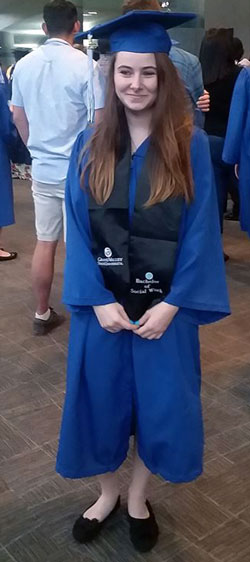Editor’s note: While our series Grads with Grit focuses on students who have overcome formidable struggles to graduate from high school, today we highlight a college graduate, Jordan Lovett, who was previously highlighted in our continuing series “The Burden of Poverty: A Backpack of Heartache.”

Five years after sharing her story about growing up in poverty, a mature, confident, 22-year-old Jordan Lovett walked into a local coffee shop. She had graduated days earlier from Grand Valley State University with a bachelor’s degree in social work.
“It’s just now hitting me,” said the petite, blue-eyed Lovett about donning her cap and gown and walking across the graduation stage. She took a minute to reflect on how far she’s come.
“I believe I’ve changed a lot since I started,” she said. “I used to be more nervous and didn’t really want to put myself out there. I had more of a closed mindset. Throughout my journey in the social work program, I’ve been able to open up more. I am more confident with myself and I am able to listen to other people’s views.”
See Jordan Lovett and two other Grads with Grit, Nik Ursiny and Shamar Green, profiled by Maranda on WOTV 4 Women
It was the third time I had sat down with Lovett, whom I first met in 2014 while looking for a student to interview about the impact of poverty in Kent County schools. Then-Superintendent David Britten recommended the Lee High School senior because of her ability to advocate for herself.

Lovett struggled with housing insecurity — living in motels and other temporary homes — and faced many barriers tied to poverty. Despite that, she had a 3.5 GPA and was taking a challenging slate of classes, including pre-calculus and college English. She planned to go to college — the first in her family — and pursue a degree in elementary education. She told of growing up uncertain about her living arrangements or where money for food or clothes would come from.
With my colleague, Charles Honey, I wrote Lovett’s story as part of a School News Network series, “The Burden of Poverty: A Backpack of Heartache.”
I checked in with Lovett the next winter. She was struggling as a freshman at Aquinas College. Her grades weren’t great and she was stressed out trying to work, pay the bills, and complete 18 credits. She had already enrolled in Grand Rapids Community College for the next semester, to save money. She was one of many students in college who have the imposter feeling of, “I don’t belong here.” I wrote her second story as a bigger piece about how barriers for low-income college students don’t end at the Admissions Office door.
‘Because of the struggles our family went through, it’s helped me be able to understand other people’s struggles at a more personal level.’ — Jordan Lovett, Grand Valley State University graduate
But rather than give up, Lovett found her footing at GRCC, earned her associate’s and enrolled at GVSU. “I liked Grand Valley. I made a lot of connections with people,” she said. “I feel like a lot of us were in the same boat. A lot of us were working and doing a bunch of things at once.”

Getting to Graduation Day
Three years passed and I noticed through Facebook posts that Lovett was finding her way. She got braces and her driver’s license, both major personal milestones, but also endured heartache. Her father, Terry McClintock, passed away last year, and so did her sister’s fiance.
I knew it was time for a third article.
Lovett recently finished an internship at Bowen Elementary School, in Kentwood Public Schools, where she assisted the Kent School Services Network coordinator. Along with working directly with students, Lovett focused on attendance and was in charge of the program Hand2Hand, which provides students with backpacks filled with food for over the weekend. She also helped families fill out forms to receive free or reduced-cost lunches.
She worked closely with Bowen Principal Blair Feldcamp, who noticed her ability to connect with children. “You’ve got to work with kids, Jordan,” he told her. “You get them and they get you.”
Lovett could identify, understand and relate to families’ difficulties, Feldcamp said.
“Jordan went wherever she felt she was needed,” he said. “She had solid relationships with kids, understood the value of data. She was starting to grow into a role. She got comfortable with us, where she felt she could provide some input.”
She’s now working at Centria Autism, leading therapy for a 6-year-old child, and at retail store Five Below. She’s applying for a 10-month accelerated master’s degree program in social work at Spring Arbor University, and would like to work as a school counselor or social worker someday.
Lovett said she pursued social work because of different options in the field. But there’s more to it than that — she wants to help people step out of their comfort zones.
“You get to work with a variety of people from all around. You are connecting with them and putting yourself out there to invite them to put themselves out there. You are getting the chance to advocate for those who can’t.”
She also knows she can relate at a level many people can’t.
“Because of the struggles our family went through, it’s helped me be able to understand other people’s struggles at a more personal level, which will help me to connect with my clients more. The fact that I have been through what most of them have been through, I think will influence my job a lot.”

Knowing Others’ Struggles
Lovettt’s mother, Sheri McClintock, and her boyfriend, Cameron Poisson, have been among her biggest supporters. Britten has also remained in touch.
“I’m very proud of her success to date, especially given the mental, emotional and physical struggles she’s faced,” her former superintendent said. “I think it goes to show how important it is for the Jordans of this world to have people in their lives who encourage and support them. Many of these young folks are ‘invisible’ to everyday people and that can add to the overwhelming struggle.
“Besides the love Jordan has received from her mother, she also has benefitted from the support of her boyfriend and his family,” he added. “I think Jordan has turned a critical corner and has learned to accomplish just about anything she wants.”
Lovett has accrued about $28,000 in student loans, but looks at the debt as a means to getting where she wants to be. “I think it was worth it,” she said. “I will be paying for it for a long time, but in the long run it will be worth it because I will be doing something I enjoy doing.”
Before we finished our coffee, I asked Jordan what kept her focused. What kept her going when things were tough?
“It was just thinking about what I want my family to have when I start one,” she said. “I want them to be able to do a lot. I don’t want the financial part to be such a burden.”
She also likes the fact that her degree will allow her to help people overcome struggles she knows can remain invisible unless someone else knows what they feel like. It’s the chance to reach out, to help.
That’s what social work is all about, she said. That’s what Jordan is all about.
“We are in it for the outcome, not the income.”









